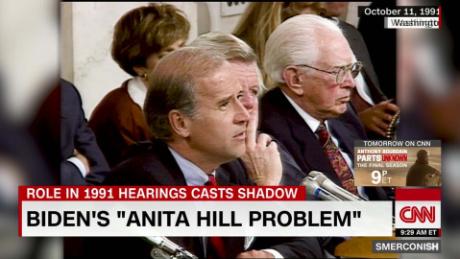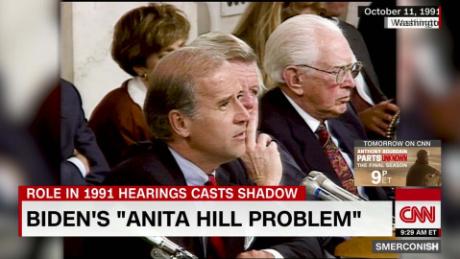His 2020 debut opened well — with a resonant 6 a.m. video blast that leveraged his strength of character to argue that the current President poses a mortal threat to America’s soul.
He followed up with a steady stream of endorsements from senior Democrats and a tribute passed through an aide to Barack Obama, a politically helpful gesture that none of the other 19 Democratic candidates mustered.
But barely seven hours in, there came a reminder of some of Biden’s most glaring vulnerabilities, with a flare-up of the 1990s drama surrounding Anita Hill that reverberated with racial and gender overtones.
Suddenly, the focus was on perceptions that the 76-year-old former vice president is out of step with his times, is accident-prone on the campaign trail and could be haunted by a long Washington record that is a poor tonal fit for the 21st century.
CNN’s Brianna Keilar asked a top Biden staffer if he had apologized to Hill for the way she was treated during the Senate confirmation hearings he had chaired for Supreme Court Justice Clarence Thomas.
Deputy Campaign Manager Kate Bedingfield said on “Right Now” that the former vice president had recently spoken with Hill, who accused Thomas of sexual harassment in 1991.
A spokesperson then offered more details, saying Biden had shared his “regret for what she endured and his admiration for everything she has done to change the culture around sexual harassment in this country.”
Hill shared her own recollection of the conversation with The New York Times, saying she could not support Biden until he was held accountable for hearings in which her story came under attack. She said he didn’t really understand the damage the episode had done to her.
“I cannot be satisfied by simply saying I’m sorry for what happened to you. I will be satisfied when I know there is real change and real accountability and real purpose,” she said.
Hill also expressed concern about allegations of physical contact by Biden that had made several women uncomfortable, for which the former vice president has apologized.
Archive footage of the Thomas hearings paints a picture of an African American woman confronting skepticism about her claims from a hostile committee full of white middle-aged men.
Hill’s treatment is particularly jarring in light of the #MeToo movement, which revolutionized how such allegations from women are received in public life.
Memories of the hearings reverberate especially in the Democratic Party, which is undergoing its own transformation, and is energized by female voters and forces of gender and racial diversity.
Female voters, and African American women in particular, are crucial in the Democratic primary race, making the question of Hill even more politically sensitive for Biden.
He and his fellow septuagenarian Bernie Sanders are under particular pressure as veterans of a previous political era to show they understand just how much the Democratic Party has changed in recent years.
Long-simmering controversy
Thursday’s first mystery was why Biden’s campaign had not somehow passed word of his contact with Hill ahead of his first day on the trail, to ensure it didn’t overshadow his big moment. The second mystery was why, in the more than two decades that have passed since 1991, Biden waited until the run-up to his presidential bid to make the call.
And after reaching out to Hill, the decision to apparently not offer her an explicit apology in a way that could help him get past the long-simmering controversy will also come under scrutiny.
The kerfuffle was a reminder of the spotlight that Biden faces as he returns to front-line politics 11 years after his last campaign in his own right and the extra expectations that rest on such a well-known front-runner.
It is not the first time that a Biden presidential campaign launch has suffered from self-inflicted wounds.
In the 2008 race, he trampled on his own announcement by calling Obama “clean” and “articulate” in remarks that struck some observers as racially offensive and for which he expressed deep regret.
Biden had to abandon his 1988 presidential campaign after being caught in a plagiarism storm.
It is unlikely that Hill’s return to the spotlight will cause that kind of havoc to his campaign — but it is a vulnerability that his party rivals can use and one that the former vice president has not yet adequately navigated.
Strong opening argument
Earlier, Biden displayed the political star power and credibility he could bring to a debate with Trump about character.
He referenced Trump’s handling of a white supremacist rally in Charlottesville, Virginia, in 2017 to argue that the President is imperiling the core values of the United States itself.
“He said there were quote some very fine people on both sides,” Biden said in his campaign video.
“With those words, the President of the United States assigned a moral equivalence between those spreading hate and those with the courage to stand against it.
“And in that moment, I knew the threat to this nation was unlike any I had ever seen in my lifetime.”
The video made a coherent argument about why Biden was running for president, why he is uniquely placed to respond to Trump and, even with the primary in its nascent months, allowed voters to envisage a clash between the President and him.
A critic might argue that Biden did not hit the key themes of the Democratic race — jobs, rising health care prices and the cost of college. And attacks on Trump’s fitness for office did not have much success for either Republicans or Democrats in 2016.
But the video established the kind of robust narrative that some presidential candidates never manage to forge. It also represented a shrewd appeal to minority voters by framing Biden as a scourge of racial and ethnic division.
And it showcased another side of his character than the familiar image of him as a blue-collar champion, hinting at his campaign’s capacity to strike multiple notes at once.
Biden is often cited by strategists in Trump’s orbit as potentially the biggest threat to the President, given his appeal to voters in the industrial Midwest, who were crucial in 2016.
CNN’s Kevin Liptak and Jeff Zeleny reported Thursday that Trump has often asked his advisers about Biden’s prospects.
Trump welcomed the man he calls “Sleepy Joe” to the race with a tweet that foreshadowed a bitter race if Biden becomes the Democratic nominee.
“I only hope you have the intelligence, long in doubt, to wage a successful primary campaign,” Trump wrote.
“It will be nasty – you will be dealing with people who truly have some very sick & demented ideas. But if you make it, I will see you at the Starting Gate!”
Biden, who will argue to voters that he is the strongest possible candidate to take on the President, shrugged off the attack during a photo op in a pizza restaurant.
“Everybody knows Donald Trump,” he said.
Views: 378













